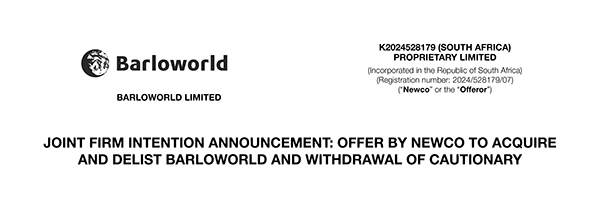Barloworld’s CEO teams up with the Zahid Group to take Barloworld private (JSE: BAW)
Here’s the blockbuster finish to the year!
This didn’t take long since the last announcement, although I’m not surprised given the really difficult governance position that the Barloworld CEO found himself in. When you are the CEO and you are also considering taking the group private, you have a massive conflict of interest. The better you perform, the higher the offer to take the group private becomes. It was in nobody’s interest for this deal to stay in the air for a long time, so I’m glad to see a joint firm intention announcement on the table.
Having said that, although the market only found out about this take-private in November, the board of Barloworld found out in February 2024 when a non-binding indicative offer was put on the table. Despite all the protocols put in place to manage the governance issues, it still wouldn’t have been easy.
Still, I can’t see Barloworld shareholders complaining. The share price just closed 15.5% higher at R107! The offer price is R120 with no adjustment for the R3.10 per share dividend declared by Barloworld last month, so in reality the offer is R123.10 per share.
This is a premium of 87% to the 30-day VWAP calculated based on 12 April, which was the date before the first cautionary announcement was released. Personally, I don’t think that’s the right date for comparison. It was a bland cautionary that was renewed several times before we finally got proper details on 15 November that a full take-private was on the table. The share price was just below R83 at that stage in November. Don’t get me wrong, there’s still a decent premium here, but April isn’t the right date to use.
The deal sees a consortium putting a scheme of arrangement on the table, which means they want to get all the shares not already held in Barloworld. The consortium includes the current CEO (Dominic Sewela) and the Zahid Group, a long-term shareholder of Barloworld. Zahid Group also has an existing business relationship with Caterpillar, with the announcement noting that the yellow goods group (a key partner of Barloworld) has expressed its support for the deal.
Interestingly, there’s also a standby offer, which you don’t always see alongside a scheme. This means that even if the scheme fails to generate the required support, shareholders who want to sell at the offer price will be able to accept an offer. This means that the consortium is also happy to proceed even if they can’t get all the shares. Assuming the scheme goes ahead, they are writing a cheque here for R17.1 billion!
In case you’re wondering, one of the conditions for the scheme is a legal opinion in the US that confirms that there is no basis for a voluntary disclosure of US sanctions violations to the US Department of the Treasury Office of Foreign Assets Control. There is no materiality threshold here i.e. any breach is enough for the scheme to collapse. There are also other material adverse change provisions that reference minimum levels of EBITDA etc. – nothing unusual there.
The independent board isn’t playing games here, appointing Rothschild & Co as the independent expert on this deal. That’s an unusual and expensive name. The expert has opined that the terms and conditions are fair and reasonable, so the independent board intends to recommend that shareholders vote in favour of the deal.
This is going to be a complicated deal to implement. I would be surprised to see it finalised before September next year.
You can refer to the full announcement here.
British American Tobacco reaffirms full-year guidance (JSE: BTI)
Low-single digit growth is the order of the day here
British American Tobacco has announced that the second half of the year is accelerating in line with expectations, which means they expect the full-year performance to be in line with guidance. This is the kind of stuff that the market likes hearing.
As is the norm at British American Tobacco, the announcement is full of all the fancy terms that the ESG consultants and PR people came up with, like a “Smokeless World” – the word smokeless being interpreted in a narrow fashion here, given the clouds that come out of the average vaping device.
For years, illicit cigarettes have been a huge issue. Criminals have made a fortune from this stuff. Today, illicit single-use vapour products are now an issue, particularly in the US where volumes have been dropping thanks in part to the presence of illegal products. Elsewhere in the world, some countries are banning vapour products altogether – now that is a Smokeless World. The point here is that the group plays in a difficult space.
Overall, global tobacco industry volumes are expected to be down 2%. Thanks to ongoing pricing increases (basically, making addicted people pay more each year), British American Tobacco can generate low-single figure earnings growth and achieve a 90% cash conversion ratio, so the dividends are pretty consistent. Best of all, the bunnies and rainbow unicorns will thank you, as the group has such a great ESG score that you can even access it through ESG-friendly funds!
And that tells you most of what you need to know about how sensibly ESG is applied in the real world.
Positive news for FirstRand in the UK (JSE: FSR)
The fight in the motor finance business isn’t over yet
If you’ve been following FirstRand recently, you’ll know that the group is having a tricky time of things in the UK. After a shock court ruling, the motor finance industry has become far more onerous. There could also be major financial penalties applied as well.
I’m no expert on this matter at all, but what I’ve read does sound like the courts went way too far here. The UK Supreme Court has now granted leave to appeal the ruling, with the appeal expected to be heard between January and April 2025. So, there are enough question marks around the ruling that it will head back to the courts.
That’s good news for FirstRand.
A tame sales performance at Libstar (JSE: LBR)
It doesn’t look like the interim results will be repeated for the full year
Libstar has released a voluntary pre-close update. The good news is that the fourth quarter was better than the third quarter. The bad news is that the overall performance still isn’t much to get excited about.
As you would expect in a diversified food group like Libstar, there are areas of the group that performed well and there are areas that have been struggling. For example, Wet Condiments enjoyed solid retail demand, while the Baking category struggled with weak demand for wraps in restaurants. The Lancewood business increased its market share in soft cheese and yoghurt, while value-added meats underperformed due to lower beef volumes in restaurants.
You can’t possibly guess how each underlying business will perform in any given year. Instead, you can only hope that the overall performance is solid. Sadly, revenue growth for the year-to-date as at 22 November was just 2.5%. Price and mix contributed 5.4% and volume declines were 2.9%. Perishable Products grew just 0.4%, with volumes down 3.4%. Ambient Products grew 4.9% despite volumes down 2.5%.
Despite the difficulties in volumes, gross margins were in line with the prior year. That’s impressive. Still, it feels like it won’t be easy for the interim performance of normalised HEPS growth of 11.4% to be carried forward to the full year. At least the normalised debt to EBITDA ratio is in line with the interim number, with higher inventory balances offset by lower capital expenditure.
In good news for the balance sheet, the disposal of Chet Chemicals will have an effective date of 30 December.
Workforce shareholders say yes to the take-private (JSE: WKF)
Another listed company is on its way out
Delistings are nothing new on the JSE, particularly among smaller companies with illiquid shares. If the register is tightly held and there isn’t much interest among third-party shareholders, then the burden of being listed far outweighs the benefit.
Workforce Holdings is just the latest example, with Force Holdings and concert parties taking it private. The price on the table for the scheme of arrangement is R1.65 per share and this was enough to get shareholders across the line, with strong approval for the deal at the general meeting.
Nibbles:
- Director dealings:
- A director of a major subsidiary of RFG Holdings (JSE: RFG) has sold shares worth a total of R6.4 million.
- Acting through Titan Fincap Solutions, Dr. Christo Wiese has bought a further R737k worth of exchangeable bonds in Brait (JSE: BAT). Remember, these instruments are distinct from the ordinary shares.
- A director of Spar (JSE: SPP) bought shares worth R368k.
- To save on costs, Telkom (JSE: TKG) has decided to have just one credit rating agency instead of two. They’ve decided to drop Moody’s Ratings, leaving them with just S&P Global Ratings.
- The JSE has ruled that the disposal by Conduit Capital (JSE: CND) of its stake in Century 21 for R7.2 million will be a Category 2 transaction. This means that a circular won’t be required, which takes a significant burden off the group.





